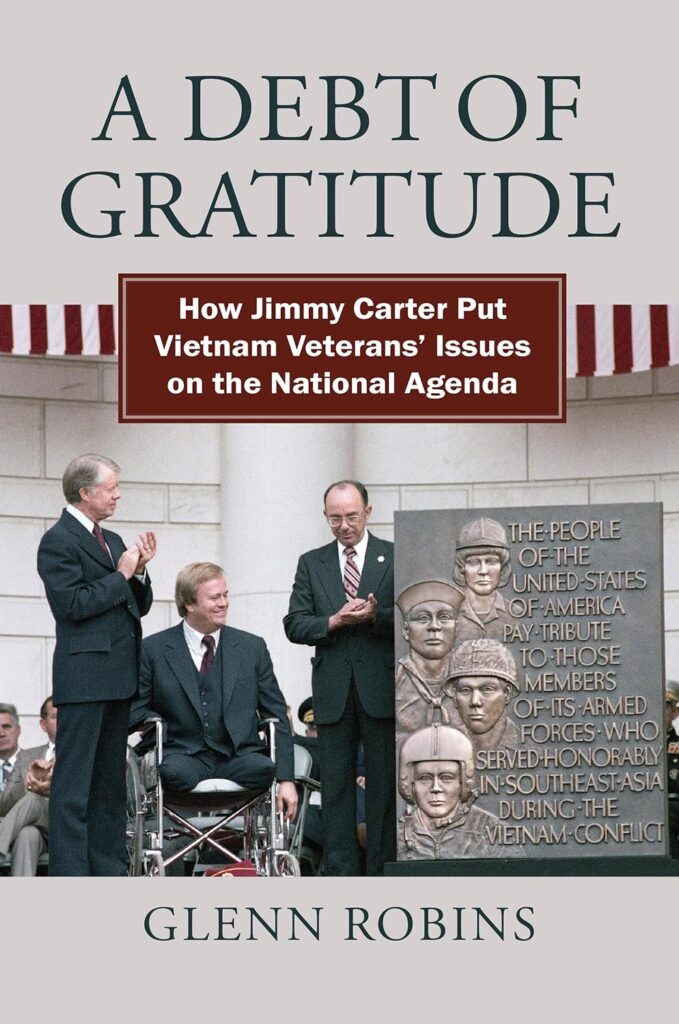By Glenn Robins.
Lawrence: University Press of Kansas, 2024.
ISBN 978-0-70063-783-6.
Notes. Bibliography. Index.
Pp. xi, 190. $49.99.
A Debt of Gratitude examines Jimmy Carter’s ambition to elevate and celebrate returning Vietnam War veterans. Glenn Robins’s account is meticulously researched, using the archives of the Jimmy Carter Presidential Library and the Georgia Archives. The genesis of Carter’s desire to acknowledge Vietnam veterans for their service in an unpopular war began with the creation of the Georgia Advisory Committee on Vietnam Veterans (GACVV). The advisory committee had an objective to identify any problems Vietnam veterans and family members of those who were prisoners of war, killed in action, and missing in action were experiencing, and to collect those concerns and broadcast those issues to the public. The GACVV then proposed solutions to veteran and family concerns to Governor Carter. The GACVV was the initial momentum Carter needed to vocalize his concerns for Vietnam veterans on a national platform.
Carter’s platform for returning Vietnam veterans included college tuition, a job stimulus package, and an expression of gratitude to the 2.7 million Vietnam veterans. His Vietnam GI Bill Improvement Act proposed increased Veterans Affairs compensation, a cost-of-living allowance, improved educational benefits, and a recognition that Vietnam veterans were not being accepted or appreciated the way previous veterans from World War I and World War II were honored. Carter’s debt of gratitude expressed his deep concern for Vietnam veterans who faced unprecedented hardships, including unemployment, drug addiction, and mental health needs. The intent of Carter’s platform was to support the successful reintegration of veterans into civilian social and professional life.
As the GACVV elevated Carter on the national political stage, he continued to champion a message of unity in embracing and supporting Vietnam veterans. Throughout his presidency, he navigated sensitive political challenges concerning his pardoning deserters, other than honorable discharges, and increasing GI Bill funds for all veterans. Robins provides examples of combat veterans who departed the military with less than honorable status despite exemplary service during combat operations in Vietnam. Robins also discusses the legal and political dilemma Carter faced with his desire to pardon thousands of draft evaders who opposed the war and fled to Canada and other countries.
Carter’s agenda lost steam with veterans and veteran organizations, who took a personal offense to his soft-handed approach to pardoning less than honorable service members and draft evaders. Carter genuinely believed that this controversial approach was the only way to reconcile divisions within the country. The overwhelming response of veterans’ organizations was to politically and financially support Ronald Reagan in the 1980 presidential election. Robins explores the statements of the Veterans of Foreign Wars, American Legion, and several other veteran organizations objecting to Carter’s action. Robins summarized their feelings with a quote from American Legion representative, Frank I. Hamilton who stated the only way to “reverse the outrages and dehumanizing treatment” of veterans from the Carter administration was to elect his opponent. One of Robins’s major critiques of Carter’s strategy was the politicizing of veterans’ issues throughout his presidential campaign. His analysis on this critique is valuable for future policymakers and elected officials.
Veterans’ issues present a complex historical problem to American society. This book will appeal to a wide audience including any individual interested in the history of the Vietnam War or Veteran’s Affairs, military senior leaders, policymakers, and elected representatives. Caring for veterans has been a 250-year challenge. Immediately after a conflict ends, public support for veterans is at its strongest. However, as veterans age and the cost of care rises, public memory fades and support waivers. Robins’s book presents these very challenging realities in a succinct and articulate manner, displaying the differences between good intention versus real world results. Senior military leaders and elected representatives can take advantage of Robins’s research to improve the handoff between the Department of Defense and the Department of Veterans Affairs of those transitioning from active service to veterans’ status. Carter’s desire to increase gratitude and recognize citizen soldiers speaks to the President’s character and his humanitarian nature. It also calls the country to remember its soldiers and veterans are worthy of the nation’s debt of gratitude.
Sergeant Major William H. Powers, Jr., USA
El Paso, Texas
